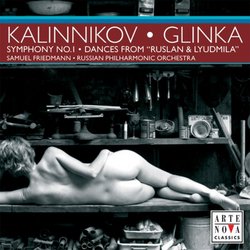Echt-Russian Music...(Reissue of ASIN: B000026D38)...
Sébastien Melmoth | Hôtel d'Alsace, PARIS | 04/24/2008
(5 out of 5 stars)
".
(Disc is reissue of ASIN: B000026D38 with different cover art.)
This fine symphony by the short-lived Vasily Kalinnikov is a splendid work filled with echt-Russian themes. Apparently the piece had some little currency at the Fin de Siècle--endorsed by Tschaikovsky, seeing performances in Mosko, Vienna, and Berlin.
Kalinnikov--(like Arensky)--succumbed to tuberculosis, though he tried to stave-off the disease by residing at Yalta (see Chekhov's story "The Duel" for a picture of Russian life in the Crimea during the later-19th Century The Duel and Other Stories (Dodo Press)).
Like Arensky's First Symphony, Kalinnikov's g-minor Symphony features fine orchestration with Russian folk melodies. Arensky: Symphony No. 1 and Premiere Recordings
Both Symphones should be more often enjoyed.
Kalinnikov especially sounds like an excellent fusion of Borodin, Glazunov, and R.-Korsakov--with hints of Bruckner.
Movement I, for example, employs a curious "rising" motif expounded by tubas and horns in a Brucknerian manner. The theme is repeated three times.
Movement II (Andante Commodamente) seems quasi-Brucknerian--(or even presciently Mahlerian) in the use of harp, horns, and English horn.
Movement III (scherzo) is especially Borodinesque, by turns both plangent and playful in the use of English horn and flute, too suggesting a certain grandeur in the tutti passages. Borodin: Orchestral Works
Movement IV (Allegro) is rousing in the Borodinian fashion and attempts a cyclical method by reviewing the "rising" motif of Movement I.
Not to be "cheeky," but another reviewer carps of the relaxed tempi of this realization. Other reviewers chide the brisk tempi of Järvi Kalinnikov: Symphony Nos. 1 & 2 and Kuchar Kalinnikov: Symphonies Nos. 1 & 2. I prefer this more expansive Brucknerian reading, and the price is right. Might check Svetlanov Kalinnikov: Symphony No. 1; Rimsky-Korsakov: Orchestral Work .
."
Only Friedmann convinces me this is a truly great symphony
Neil Ford | Sydney, Australia | 12/15/2009
(4 out of 5 stars)
"Kalinnikov's first symphony is a little-known delight, waiting to be discovered by admirers of Russian music or nationalistic Romantic symphonies in general. Sadly, Kalinnikov's career was troubled by his impoverished origins, which forced him to abandon his studies at the Moscow Conservatory (he continued studying at the Moscow Philharmonic Society). He struggled with low-paying orchestral jobs, until Tchaikovsky assisted him into a post which he shortly had to leave when he contracted tuberculosis at age 27. He moved to the healthier environs of Crimea and continued composing, dying at the age of 34. Despite his sad life story, this music is bright and vivacious and truly memorable, in the same musical family as Borodin, Rimsky Korsakov and the early symphonies of Tchaikovsky.
Samuel Friedmann is undoubtedly a talented conductor. He shows a strong understanding of the Kalinnikov symphony, playing with emotion and character, but also with notable orchestral clarity. His tempos are perhaps on the slow side but this is only problematic in the first movement, which perhaps needs a bit more drive to balance it against the other movements. The Russian Philharmonic Orchestra, a "pick-up" ensemble often used by labels such as Naxos, is not first rate (the main problem is occasional weakness in the violins) but enthusiastic, diligent and well-recorded.
There is not much choice for this symphony at the moment. I have heard the performance on Naxos and found it generally inferior: Kuchar lacks the folkish energy of Friedmann (Kuchar's tempos are usually faster but feel slower); the slow movement lacks the hushed magic found in the Friedmann, and most importantly Kuchar cannot match Friedmann in the grand finale. Friedmann broadens the tempos to make the final minutes sound truly magnificent - Kuchar sounds perfunctory by comparison. Also, the Naxos sound has the same grey veil of reverberation that troubled Kuchar's excellent Prokofiev cycle, recorded in the same venue.
The Svetlanov recording is efficiently played but the sound is on the poorer side of 1960s/70s Soviet. He is better than Kuchar, but again the finale sounds perfunctory - only Friedmann convinces me this is a truly great symphony. I haven't heard the Kondrashin recording, but I assume the sound would be somewhat dated. In all, for this symphony, this recording is the best and first choice.
Both Kuchar and Svetlanov include the second symphony, while Friedmann only includes a couple of Glinka overtures, which to be honest are not very interesting. Svetlanov's recording of the 2nd symphony is troubled by some squawking winds, but is nonetheless superior to Kuchar's performance, so he is to be preferred in that work. They both take the first movement rather too fast (Jarvi is even faster here); I think Friedmann has shown that grander tempos bring out the best in this composer. If only Friedmann could have recorded the second symphony as well!
"


 Track Listings (6) - Disc #1
Track Listings (6) - Disc #1